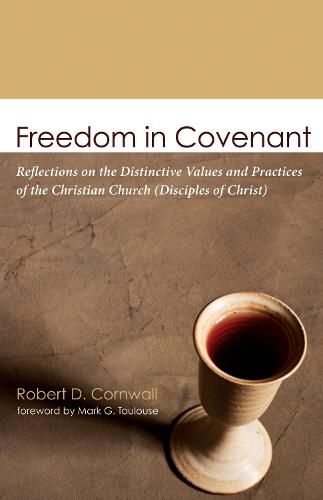Readings Newsletter
Become a Readings Member to make your shopping experience even easier.
Sign in or sign up for free!
You’re not far away from qualifying for FREE standard shipping within Australia
You’ve qualified for FREE standard shipping within Australia
The cart is loading…






This title is printed to order. This book may have been self-published. If so, we cannot guarantee the quality of the content. In the main most books will have gone through the editing process however some may not. We therefore suggest that you be aware of this before ordering this book. If in doubt check either the author or publisher’s details as we are unable to accept any returns unless they are faulty. Please contact us if you have any questions.
In an age of decreasing denominational loyalty, questions of identity have become important. Both church members and inquirers wonder what to make of a denomination’s core values, mission, and common practices. Because the Christian Church (Disciples of Christ) was born as a movement of reform on the American frontier during the early nineteenth century, it is marked by the time and place of its birth. The message it offered at the time was one of Christian unity rooted in theological simplicity and freedom of belief and practice. This message influenced the way the tradition came to understand biblical interpretation, theology, the sacraments, ministry, and its eschatology. As the movement matured, many recognized that this message of freedom could lead to unfettered individualism and tended to undermine congregational life and cooperation beyond the congregation. In response, Disciples leaders turned to the biblical idea of covenant to balance the message of freedom and link congregations with other forms of church without creating hierarchical systems. If, as some have suggested, this is a movement whose time has come, then it is important to understand the movement’s identity and core values, which have been formed within the fulcrum of the tension existing between freedom and covenant.
$9.00 standard shipping within Australia
FREE standard shipping within Australia for orders over $100.00
Express & International shipping calculated at checkout
This title is printed to order. This book may have been self-published. If so, we cannot guarantee the quality of the content. In the main most books will have gone through the editing process however some may not. We therefore suggest that you be aware of this before ordering this book. If in doubt check either the author or publisher’s details as we are unable to accept any returns unless they are faulty. Please contact us if you have any questions.
In an age of decreasing denominational loyalty, questions of identity have become important. Both church members and inquirers wonder what to make of a denomination’s core values, mission, and common practices. Because the Christian Church (Disciples of Christ) was born as a movement of reform on the American frontier during the early nineteenth century, it is marked by the time and place of its birth. The message it offered at the time was one of Christian unity rooted in theological simplicity and freedom of belief and practice. This message influenced the way the tradition came to understand biblical interpretation, theology, the sacraments, ministry, and its eschatology. As the movement matured, many recognized that this message of freedom could lead to unfettered individualism and tended to undermine congregational life and cooperation beyond the congregation. In response, Disciples leaders turned to the biblical idea of covenant to balance the message of freedom and link congregations with other forms of church without creating hierarchical systems. If, as some have suggested, this is a movement whose time has come, then it is important to understand the movement’s identity and core values, which have been formed within the fulcrum of the tension existing between freedom and covenant.